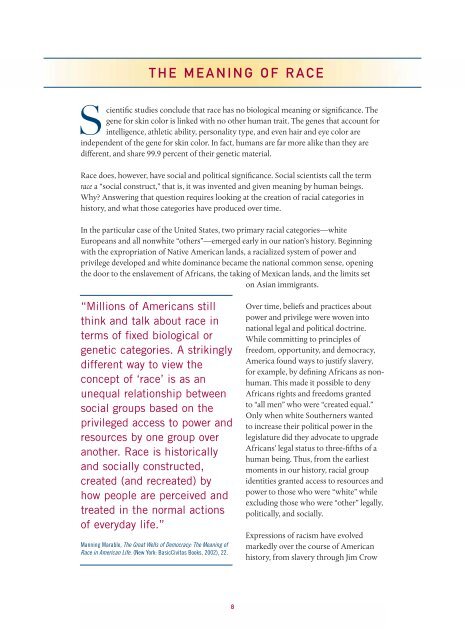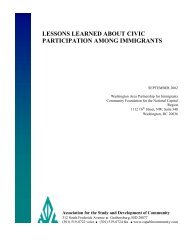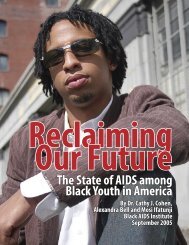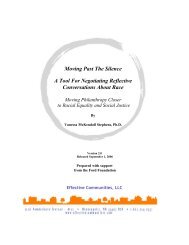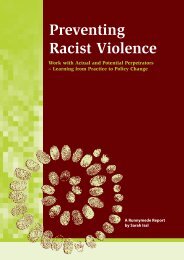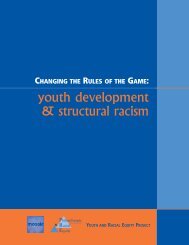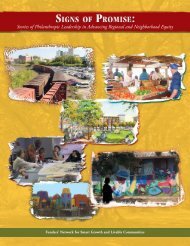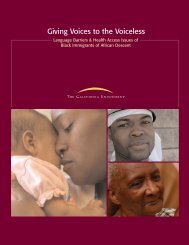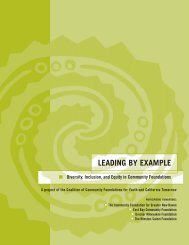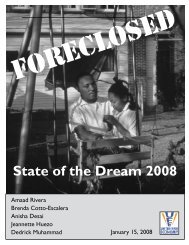Structural Racism and Community Building - The Aspen Institute
Structural Racism and Community Building - The Aspen Institute
Structural Racism and Community Building - The Aspen Institute
Create successful ePaper yourself
Turn your PDF publications into a flip-book with our unique Google optimized e-Paper software.
THE MEANING OF RACE<br />
Scientific studies conclude that race has no biological meaning or significance. <strong>The</strong><br />
gene for skin color is linked with no other human trait. <strong>The</strong> genes that account for<br />
intelligence, athletic ability, personality type, <strong>and</strong> even hair <strong>and</strong> eye color are<br />
independent of the gene for skin color. In fact, humans are far more alike than they are<br />
different, <strong>and</strong> share 99.9 percent of their genetic material.<br />
Race does, however, have social <strong>and</strong> political significance. Social scientists call the term<br />
race a “social construct,” that is, it was invented <strong>and</strong> given meaning by human beings.<br />
Why? Answering that question requires looking at the creation of racial categories in<br />
history, <strong>and</strong> what those categories have produced over time.<br />
In the particular case of the United States, two primary racial categories—white<br />
Europeans <strong>and</strong> all nonwhite “others”—emerged early in our nation’s history. Beginning<br />
with the expropriation of Native American l<strong>and</strong>s, a racialized system of power <strong>and</strong><br />
privilege developed <strong>and</strong> white dominance became the national common sense, opening<br />
the door to the enslavement of Africans, the taking of Mexican l<strong>and</strong>s, <strong>and</strong> the limits set<br />
on Asian immigrants.<br />
“Millions of Americans still<br />
think <strong>and</strong> talk about race in<br />
terms of fixed biological or<br />
genetic categories. A strikingly<br />
different way to view the<br />
concept of ‘race’ is as an<br />
unequal relationship between<br />
social groups based on the<br />
privileged access to power <strong>and</strong><br />
resources by one group over<br />
another. Race is historically<br />
<strong>and</strong> socially constructed,<br />
created (<strong>and</strong> recreated) by<br />
how people are perceived <strong>and</strong><br />
treated in the normal actions<br />
of everyday life.”<br />
Manning Marable, <strong>The</strong> Great Wells of Democracy: <strong>The</strong> Meaning of<br />
Race in American Life. (New York: BasicCivitas Books, 2002), 22.<br />
Over time, beliefs <strong>and</strong> practices about<br />
power <strong>and</strong> privilege were woven into<br />
national legal <strong>and</strong> political doctrine.<br />
While committing to principles of<br />
freedom, opportunity, <strong>and</strong> democracy,<br />
America found ways to justify slavery,<br />
for example, by defining Africans as nonhuman.<br />
This made it possible to deny<br />
Africans rights <strong>and</strong> freedoms granted<br />
to “all men” who were “created equal.”<br />
Only when white Southerners wanted<br />
to increase their political power in the<br />
legislature did they advocate to upgrade<br />
Africans’ legal status to three-fifths of a<br />
human being. Thus, from the earliest<br />
moments in our history, racial group<br />
identities granted access to resources <strong>and</strong><br />
power to those who were “white” while<br />
excluding those who were “other” legally,<br />
politically, <strong>and</strong> socially.<br />
Expressions of racism have evolved<br />
markedly over the course of American<br />
history, from slavery through Jim Crow<br />
8


